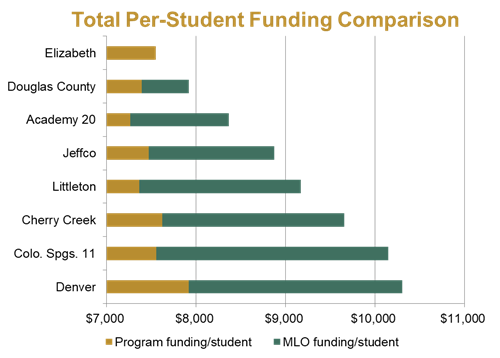Mill Levy Override 2018
Page Navigation
Mill Levy Override FAQ
-

What is a mill levy override?A mill levy is the "tax rate" that is applied to the assessed value of a property. An override is when voters approve a property tax beyond the state minimum. A school district mill levy override (MLO) provides additional operating monies for specific local needs. An MLO can be used for expenses such as compensation, equipment, staffing and programs.

What will a $1.59 million MLO be used for?Attract and retain teachers and support staff
• Offer compensation that is competitive with surrounding school districts
Health and safety
• Expand safety and security measures through equipment, training, and preparedness, including but not limited to the addition of a school resource officer and social-emotional support for students
Technology
• Provide all students with additional access to technology that facilitates learning and post-graduate success
Legacy Academy (the only charter school in the district) would receive a portion of the revenue raised based on student count, as legally required.
Will the MLO increase my taxes?The mill levy override would result in no tax increase because the district's existing bond will be retired in 2019 (the last bond was passed in 1998 and was used to build Elizabeth High School).
In fact, over time the tax rate for the MLO should decrease. The MLO is a flat amount - $1.59 million. Therefore, as more businesses are established and more properties are built within district boundaries, the $1.59 million will be spread across additional taxpayers and each taxpayer would contribute less to reach the $1.59 million MLO amount.

If an MLO passes will it sunset?No, there is no sunset on the MLO because a significant portion of the money is earmarked for ongoing expenses. A sunset would create a financial cliff that would require cuts at the time of the sunset.

Have cost efficiencies been maximized across the district?During years of state funding cuts and subsequent minimal increases, Elizabeth Schools has kept budget cuts away from classrooms as much as possible. Since 2010, the district's funding has been cut over $21.5 million cumulatively. Even though the economy is growing, limited state funding increases don’t cover the cost of inflation and rising costs of special education services, healthcare, competitive salaries, and higher cost of nearly everything.

Will all teachers' salaries be increased if the MLO is approved?Yes, and compensation for classified staff (support staff) will too. Elizabeth Schools has not been able to maintain competitive wages for employees compared to school districts and other employers in the Denver and Colorado Springs markets.

Do other districts have MLOs to support their local needs?Yes, most school districts in Colorado have MLO taxes to support their operational expenses. Over the past several years, voters have approved mill levy overrides for Cherry Creek, Denver, Littleton, Colorado Springs 11, Academy 20 and several other school districts.


